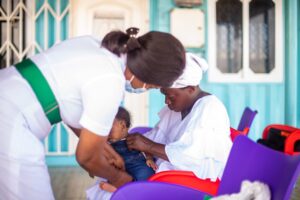UNDP urges Ghana to implement actions on right to health for the most vulnerable
 The United Nations Development Programme (UNDP) has called for the development and implementation of specific and deliberate actions that would help guarantee the right to good health for the most vulnerable people in the Ghanaian society.
The United Nations Development Programme (UNDP) has called for the development and implementation of specific and deliberate actions that would help guarantee the right to good health for the most vulnerable people in the Ghanaian society.
According to the UN Agency, prioritizing the right to health for the most vulnerable in society was the surest way to achieve the universal health coverage and other health related targets in the Sustainable Development Goals (SDGs).
Ms Belynda Amankwa, Programme Specialist, Health at the UNDP Ghana Office, sharing her thoughts with the Ghana News Agency, on the occasion of the 2024 World Health Day, said it was important that stakeholders addressed social determinants of health, made health services disability friendly and invest in women’s health.
This year’s theme for the celebration is “My Health, My Right.”
She said rising conflicts, skyrocketing cost of living and impact of climate change, threatened to derail the enjoyment of these rights particularly, by the most vulnerable.
Furthermore, the Sustainable Development Goals (SDGs) report for 2023 shows that the world is off track to achieve SDG targets on HIV, Malaria, Tuberculosis, and insufficient progress had been made to expand universal health coverage.
Throwing more light on addressing social determinants of health, Ms Amankwa, pointed out that, all persons had the right to an adequate standard of living including the provision of food, housing, and necessary social services.
She said providing these basic necessities contributed more to good health outcomes than factors within the health system.
“The World Health Organization (WHO) estimates that non-medical factors or social determinants of health account for between 30-55 percent of health outcomes.
Thus, prioritizing the right to health would require that we go beyond the health sector and address the general conditions in which people live and grow,” she explained.
Ms. Amankwa indicated that, provision of education, employment, adequate housing, water, especially for the most vulnerable including the urban poor, would help reduce health inequalities and improve health outcomes.
The United Nation’s Development Programme (UNDP)’s intervention to provide safe and hygienic sanitation solutions for urban slum areas in Kumasi was one keyway to improve health outcomes for the urban poor in Ghana, she added.
On investing in women’s health, she explained that women and girls faced major risks of unintended pregnancies, sexually transmitted infections, HIV, and depression, but often face many barriers accessing health information and services.
According to her, prioritizing the right to health for women and girls, would mean investing in data systems to collect and analyze gender disaggregated health data to accurately capture and address the health challenges of women.
It would also help to design gender responsive and transformative health polices and provide adequate support and mentorship to ensure that more women attained leadership positions in healthcare delivery systems.
Source: GNA
